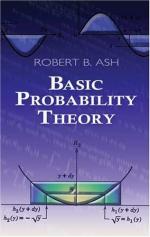|
This section contains 956 words (approx. 4 pages at 300 words per page) |

|
The theoretical probability of an event is based on the assumption that each of a number of possible outcomes is equally likely. The theoretical probability of an event can be defined as the ratio of the number of favorable outcomes to the total number of outcomes in the sample space. For example, if a die is tossed, the probability of getting a 4 is  because 4 is one of six possible outcomes. Similarly, the probability of getting a number less than 5 is
because 4 is one of six possible outcomes. Similarly, the probability of getting a number less than 5 is  , because either 1, 2, 3, or 4 is favorable.
, because either 1, 2, 3, or 4 is favorable.
The possible values of the theoretical probability of an event range from 0 to 1. If none of the possible outcomes is favorable to an event, the theoretical probability is 0. For example, the probability that the number attained on a roll of a die is greater than 8 is 0, because such an event is not a possible outcome. Similarly, the probability that the number...
|
This section contains 956 words (approx. 4 pages at 300 words per page) |

|


